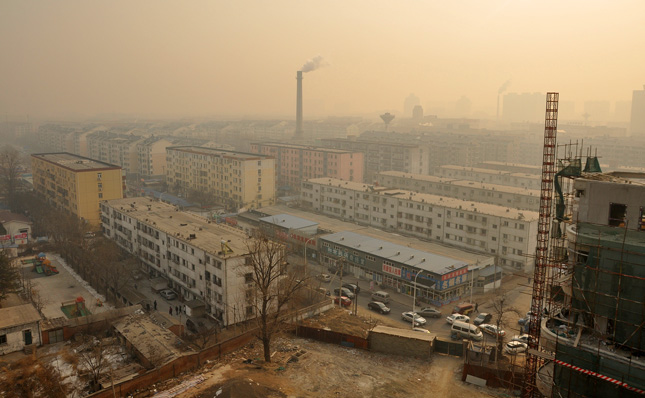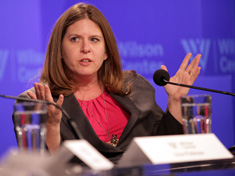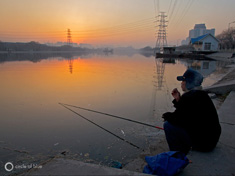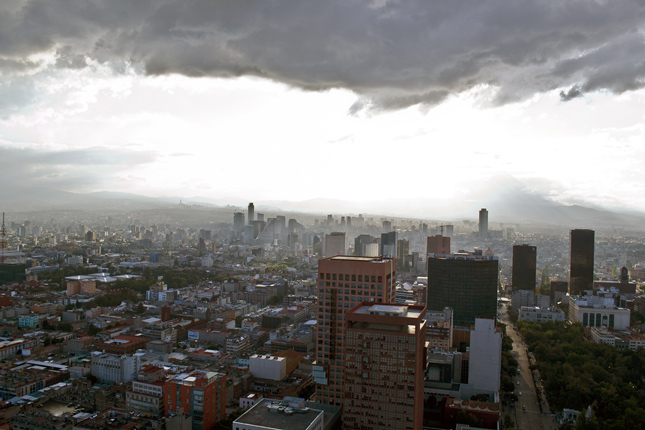-
Lisa Friedman on a More Diverse Environmental Movement and the Critical Year Ahead for Climate Talks
›
“If you care about climate change and international response to climate change, the first two weeks of December in Paris, France, will be your Super Bowl,” says Lisa Friedman, deputy editor of ClimateWire, in this week’s podcast.
-
Two Decades Trying to Solve China’s Environmental Problems: An Interview With WWF’s Tao Hu
›
Despite some critics, the recent U.S.-China agreement over carbon emissions has sparked remarkable optimism in global climate negotiations. It’s also opened the door to new bilateral engagement between the U.S. and Chinese environmental communities on other issues, including China’s massive air pollution problems (16 of the world’s 20 most polluted cities are in China).
-
‘Extreme Realities’ Sheds Light on Links Between Global Climate Dynamics and National Security
›“We cannot ignore the new reality that climate change has become a major foreign policy issue in the 21st century,” a new film by Hal and Marilyn Weiner concludes.
-
Next Stop, Lima: Building Momentum for a New Global Agreement on Climate Change
›December 1, 2014 // By Kathleen Mogelgaard
This fall, a series of significant events signaled what many see as a shift toward meaningful collective action on climate change.
-
Water and New Development Path Are Priorities in U.S.-China Climate Agreement
› NEW DELHI, India – There are nearly 1.3 billion people in this swarming democracy, where over 66 percent of eligible voters cast ballots in the general election last May. A few of them took me aside this week to express surprise at the puzzle that is the American electorate and its national leadership.
NEW DELHI, India – There are nearly 1.3 billion people in this swarming democracy, where over 66 percent of eligible voters cast ballots in the general election last May. A few of them took me aside this week to express surprise at the puzzle that is the American electorate and its national leadership. -
A Reset for International Development? UN Debates What to Include in Sustainable Development Goals
›
The 69th UN General Assembly was “an absolutely extraordinary opportunity” to rethink global development, said Genevieve Maricle, a senior policy advisor to the U.S. Ambassador to the UN Social and Economic Council (ECOSOC) who participated in the summit. [Video Below]
-
What’s Next? Two Decades Tracking the Environment-Security-Population Nexus
›
Global crises like the Ebola outbreak force us to consider what “security” really means, said Sharon Burke, senior advisor for the New America Foundation. “Is security getting our kids to school and food on the table…or are you talking about military security and defense threats that require a weapon to counter?”
-
UK Global Trends Report Forecasts Security Threats in Face of Growth, Climate and Technological Change
›October 22, 2014 // By Heather Randall
By 2045, global population will be north of 9 billion with increased urbanization and migration, natural resource stress, improved medical technologies, greater use of robotic labor, and a shift towards lifelong (and increasingly online) learning, according to a recent report from the UK Ministry of Defense.
Showing posts from category foreign policy.




 NEW DELHI, India – There are nearly 1.3 billion people in this swarming democracy, where over 66 percent of eligible voters cast ballots in the general election last May. A few of them took me aside this week to express surprise at the puzzle that is the American electorate and its national leadership.
NEW DELHI, India – There are nearly 1.3 billion people in this swarming democracy, where over 66 percent of eligible voters cast ballots in the general election last May. A few of them took me aside this week to express surprise at the puzzle that is the American electorate and its national leadership.




